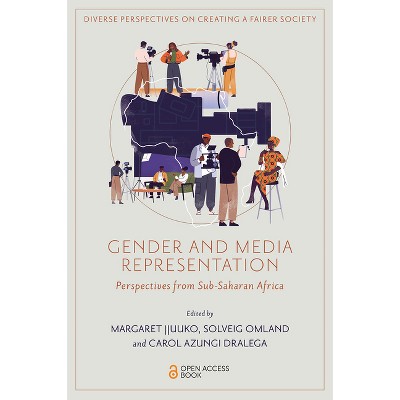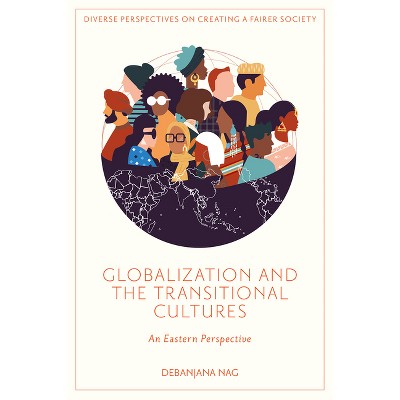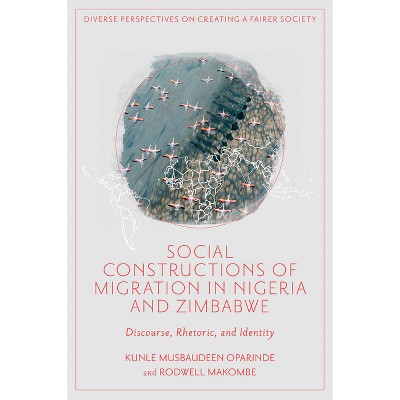Neoliberal Subjectivities at Work - (Diverse Perspectives on Creating a Fairer Society) by Muneeb Ul LaTeef Banday (Hardcover)

About this item
Highlights
- Neoliberalism and the fourth industrial revolution are argued to be the dominant forces transforming work and employment relations in contemporary times.
- About the Author: Muneeb Ul Lateef Banday is an Assistant Professor in Organizational Behavior and Human Resource Management at the Goa Institute of Management and an advanced postdoctoral researcher at the Interdisciplinary Center for Gender Studies, University of Bern.
- 176 Pages
- Social Science, Sociology
- Series Name: Diverse Perspectives on Creating a Fairer Society
Description
About the Book
Using the Indian Information Technology (IT) industry as the empirical context, Neoliberal Subjectivities at Work develops a comprehensive conceptual and analytical framework for studying contemporary employment relations governed by techno-neoliberalism.
Book Synopsis
Neoliberalism and the fourth industrial revolution are argued to be the dominant forces transforming work and employment relations in contemporary times. Using the Indian Information Technology (IT) industry as the empirical context, Neoliberal Subjectivities at Work develops a comprehensive conceptual and analytical framework for studying contemporary employment relations governed by techno-neoliberalism.
Examining how employers seek to produce employees as enterprising and technological subjects, how employees become or fail to become enterprising IT subjects and how unionized IT employees seek to contest neoliberalism through citizen-worker rights discourse, the author provides a compelling analysis of the governance and contestations of employee subjectivities. Situated in the extant debates on power, resistance and employment relations this book provides a unique account of theorizing and analyzing employees' lived experiences of neoliberalism in the Global South. Using the analytics of governmentality and intersectionality framework and studying data generated through documents, videos, and semi-structured interviews, Banday employs a post-structuralist lens to investigate how employment relations are problematized and the consequences on the employees' lives and resistance in contemporary workplaces.
With implications beyond India and the IT sector as neoliberalism and fourth industrial revolution discourses become mainstream forces governing workers, workplaces as well as policymaking, this is important reading for researchers interested in the sociology of work and organizational and management scholarship in relation to the globalized technological neoliberal capitalism.
Review Quotes
This clearly written and well-informed critical poststructuralist monograph offers fascinating insight into the tensions and contradictions in the lives of Indian IT workers. A much-needed Foucauldian intersectional exploration for scholars of careers, employment relations, and anyone interested in understanding the complexities and exploitations of the contemporary neoliberal world of work.
--Alexandra Bristow, The Open University, UKDr. Banday has produced a highly readable book focusing on Information Communication Technology employees working in India. Apart from this being a distinctive contribution to the dramatically expanding IT sector in this part of the world as a global phenomenon, the research also advances our understanding of subjectivity in the context of neo-liberal developments. This will be an important book for those interested in human resource implications of technology and for students expecting a more critical analysis of contemporary working life.--Emeritus Professor David Knights, Lancaster University, UK
This extraordinary book charts the "production" of new-age employees by the discursive forces of neoliberalism in an era of late capitalism. The book locates its empirical domain in the Indian IT sector, but also provides invaluable insights that transcend spatial and temporal boundaries to make a significant theoretical contribution.--Raza Mir, Professor, William Paterson University, USA
This theoretically sophisticated, empirically rich account of IT subjectivities breaks new ground in our understanding of how employers and their allies aim to discipline tech workers and how these same workers push back to assert their personhood. While the public tends to view Indian tech workers as the heroes of globalization, Banday exposes the high personal and social costs that lie just beneath the surface of these celebratory discourses. Rendering the familiar strange, Banday's work forces us to revisit our taken-for-granted understandings of Indian IT workers, the companies they work for, and the social and political conditions that perpetuate both their isolation and their success.--Smitha Radhakrishnan, Marion Butler McLean Professor in the History of Ideas, Professor of Sociology, Wellesley College, USA
About the Author
Muneeb Ul Lateef Banday is an Assistant Professor in Organizational Behavior and Human Resource Management at the Goa Institute of Management and an advanced postdoctoral researcher at the Interdisciplinary Center for Gender Studies, University of Bern. Its research interests include neoliberalism, labour studies, decoloniality, gender, caste and the future of work, among others. As a critical management studies scholar, Muneeb is particularly interested in the interrelationships among power, discourse, and subjectivities at work.











